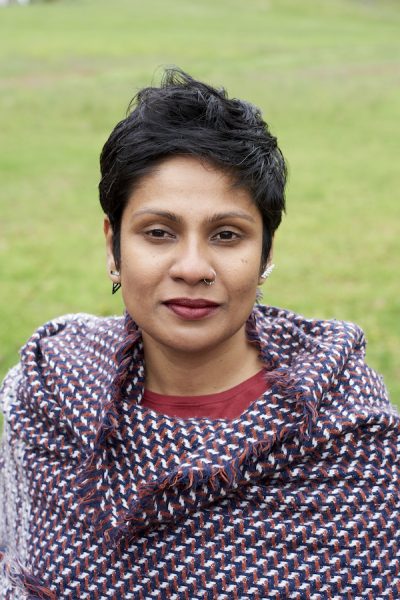What themes do you find yourself frequently writing about?
I find myself frequently returning to writing about family. I especially end up writing about siblings, possibly because, as the youngest of four, my own sibling relationships have and still profoundly shape me. I also see a lot of violence against women – and women pushing back against these violences – showing up in my work.
In addition to flash fiction, you also write essays and are currently working on a novel. Can you tell us a little bit about your novel? How do you move between long and short form?
Thank you for asking about my novel! It’s – inevitably – a family story, with three women, and their relationships, at the center of it. But it’s also about two wars, and how we – publicly and privately – remember them.
I actually never thought I would write flash! Until a few years ago, I hadn’t read enough flash to know what writers can do with the form, and so I sort of dismissed it. But now I love it, and I return to it frequently as a break from working on the novel, in part, because I can write/finish a flash piece in the spell long enough to take me out of the novel, and short enough so I don’t lose my way. I find it really hard to write short stories while working on the novel — something about needing to be immersed in each world – of the story, and the novel – to successfully pull each off — is impossible for me.
Between fiction and nonfiction?
Nonfiction comes easier to me, perhaps because I’ve had more practice at it, in that I’ve been writing some form of nonfiction for most of my life. And, personal essays are really a journey into figuring myself out. Fiction demands a willingness to go where the story wants to go, and that is hard, because I am just a teeny tiny bit of a control freak.
What can make a break a flash story?
It’s hard to say, but I think language needs to be super-super precise in flash because of its brevity of form. While I think a lot of flash can be very successful and strong without much attention to setting, flash stories without a strong sense of a character don’t really work for me as well. I also really don’t like what I think of as ‘gimmicky’ work where the form overtakes the content, which is super-vague, but it’s where the form calls attention to itself, is self-conscious.
What kind of story would you love to find in your queue this week?
I’d love food-related stories, because, um, food. I’d love something funny; there’s just not enough funny in my reading! I’d love something that makes me feel something, which is so personal; I guess I want that passé thing: emotional resonance. I’d love to see work from first-time authors, especially writers of color and LGBTQ writers. Writing that I didn’t know I’d enjoy. Thank you so much for the chance to read and select some great work!


 The SmokeLong Grand Micro Contest (The Mikey) is now an annual competition celebrating and compensating the best micro fiction and nonfiction online.
The SmokeLong Grand Micro Contest (The Mikey) is now an annual competition celebrating and compensating the best micro fiction and nonfiction online.